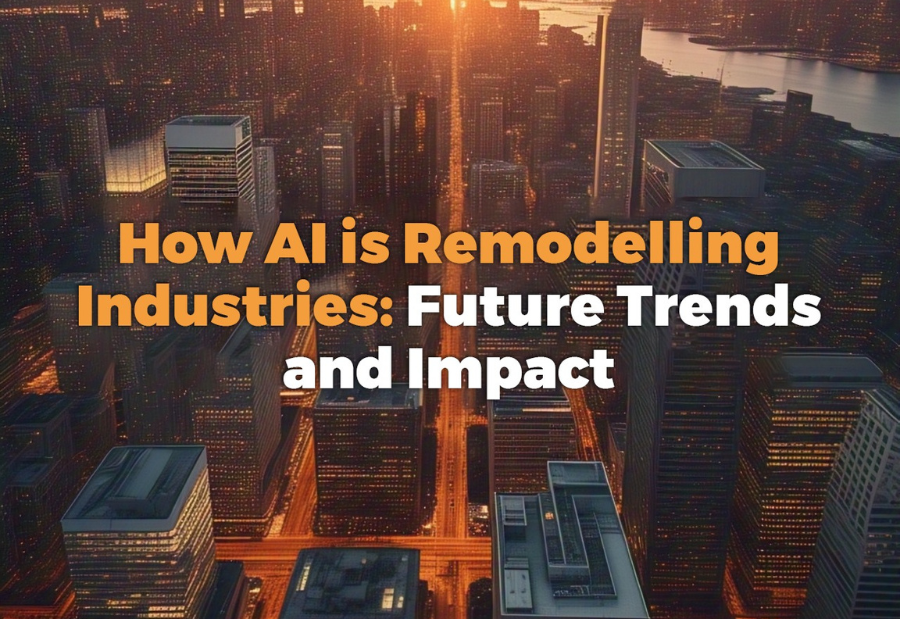Today, you will discover how AI is transforming industries like healthcare, finance, retail, and more. You will also learn in detail about the potential impacts of AI on business, jobs, and innovation in this insightful blog.
From futuristic concepts to everyday realities, artificial intelligence is swiftly transitioning and influencing industries across the globe. Whether it’s automating tasks or accessing large data sets to provide insights, AI’s impact on every business is undeniable, and its potential is limitless.
According to insights from The Mainstream, this digital revolution is not just about automation — it’s about enabling smarter ecosystems that blend human intelligence with data-driven precision. As AI continues to mature, its impact on the global economy, workforce, and innovation landscape will only deepen.
But what exactly does the future hold?
Let’s take a deeper look at how we expect AI to shape various industries and what it means for the workforce and innovation.
- AI in the Healthcare Industry
The integration of AI in the healthcare industry is creating a stir by simplifying workflows, improving patient outcomes, enhancing diagnostic capabilities, reducing errors, saving lives, and improving overall care quality.
Automated Diagnostics: AI systems assist doctors in diagnosing illnesses at an early stage, making diagnoses more reliable. They can analyze X-rays and MRIs faster and with greater accuracy than humans.
Personalized Medicine: Through AI, treatment plans can be tailored based on an individual’s genetic health data, resulting in more effective treatments with fewer side effects.
Operational Efficiency: Many hospitals and clinics have adopted AI to schedule appointments, manage inventory, and predict patient admissions. This makes the healthcare sector more productive and accessible to all.
At The Mainstream, AI-driven healthcare solutions are not just saving time but saving lives — bridging the gap between technology and compassionate care.
- AI Enhances Smart Decision-Making in Finance
By incorporating AI, financial institutions are able to make smarter decisions, avoid breaches, and help companies provide better services and solutions to customers.
Detecting Fraud: AI algorithms can help prevent fraud by analyzing spending patterns and detecting unusual transactions before they occur.
Risk Management: With AI, real-time market data can be accessed, allowing financial institutions to evaluate risks and make informed decisions faster than traditional methods.
Customer Service: AI-powered chatbots and virtual assistants have drastically changed the customer service experience, offering instant responses to queries and simplifying processes.
- AI in Retail
As soon as AI was incorporated into the retail sector, it changed the way we shop. From inventory management to creating personalized shopping experiences, retail has become one of the most dynamic sectors where AI is making a significant impact.
Personalized Recommendations: By analyzing shopping behavior and preferences, AI can suggest products to customers, improving conversion rates and customer satisfaction.
Supply Chain Optimization: AI can predict demand trends, ensuring that retailers stock the right products at the right time, reducing waste and maximizing sales.
Virtual Try-Ons: Retailers are increasingly using AI-powered augmented reality (AR) tools to allow customers to virtually try on clothes or accessories, saving time and enhancing the shopping experience.
According to The Mainstream, retailers adopting AI are seeing increased profitability and stronger customer loyalty through smarter personalization.
- AI in Manufacturing
AI in the manufacturing sector is undergoing a digital transformation, helping companies stay competitive, improve efficiency, reduce costs, and enhance product quality.
Predictive Maintenance: AI can predict when machines will need maintenance or are likely to fail, reducing downtime and maintenance costs.
Smart Manufacturing: AI-powered robots and automation are streamlining production lines, improving efficiency, and reducing human error.
Supply Chain Optimization: AI helps manufacturers optimize supply chains by predicting demand, managing logistics, and reducing delays, all while keeping costs low.
- AI in Education
AI has significantly reshaped the education industry by providing personalized learning and administrative experiences.
Personalized Learning: AI tools can adapt content and pacing to match the individual needs of each student, providing a more tailored educational experience.
Automated Grading: AI can assist teachers by grading assignments and exams, freeing up time for them to focus on more personalized instruction.
Administrative Support: AI-powered systems can automate administrative tasks like scheduling and admissions, reducing the burden on educational institutions.
- AI in Transportation
AI in transportation promises to make travel more convenient, sustainable, and cost-effective in the years ahead.
Logistics and Delivery: AI is streamlining logistics and delivery services, optimizing routes, and reducing delivery times for packages and goods.
Self-Driving Cars: One of the most talked-about applications of AI in transportation is autonomous vehicles, which are expected to drastically reduce accidents and improve traffic flow.
Smart Traffic Systems: AI-powered traffic management systems can optimize traffic lights, reducing congestion and improving transportation efficiency in cities.
- AI in Agriculture
AI is also making a significant impact on the agricultural industry by helping farmers grow more food with fewer resources and meet the demands of a growing global population.
Automated Harvesting: AI-powered robots and drones are now capable of harvesting crops, reducing labor costs and improving efficiency.
Precision Agriculture: AI systems can analyze soil health, weather patterns, and crop conditions, helping farmers make data-driven decisions to optimize their yield.
Pest and Disease Management: AI tools can detect signs of pests or diseases early, allowing farmers to take action before they spread and cause significant damage.
- AI in Entertainment
The entertainment industry is no exception when it comes to integrating AI applications. AI has diversified the entire experience by offering new ways to engage with audiences, create engaging content, and push the boundaries of what’s possible in digital content.
AI-Generated Content: AI is now capable of generating music, scripts, and even artwork, expanding the creative possibilities in entertainment.
Content Personalization: Streaming platforms like Netflix and Spotify use AI to recommend movies, TV shows, and music based on users’ preferences, creating a more personalized experience.
Interactive Gaming: AI is making video games more interactive and immersive by creating smarter NPCs (non-playable characters) and dynamic storylines.
Ending Thoughts
Simply integrating AI in business will not shape the way industries operate; the key is to strike a balance between leveraging AI’s potential and addressing the social and economic impacts it brings.
The Mainstream believes that the future belongs to organizations that treat AI as a strategic partner, not just a tool. To harness its full potential, industries must focus on ethical integration, workforce reskilling, and sustainable innovation.
The industries that will thrive in this new age are those that embrace AI not just as a tool, but as a strategic partner in driving growth and transformation.
Also read: Viksit Workforce for a Viksit Bharat
Do Follow: The Mainstream formerly known as CIO News LinkedIn Account | The Mainstream formerly known as CIO News Facebook | The Mainstream formerly known as CIO News Youtube | The Mainstream formerly known as CIO News Twitter
About us:
The Mainstream formerly known as CIO News is a premier platform dedicated to delivering latest news, updates, and insights from the tech industry. With its strong foundation of intellectual property and thought leadership, the platform is well-positioned to stay ahead of the curve and lead conversations about how technology shapes our world. From its early days as CIO News to its rebranding as The Mainstream on November 28, 2024, it has been expanding its global reach, targeting key markets in the Middle East & Africa, ASEAN, the USA, and the UK. The Mainstream is a vision to put technology at the center of every conversation, inspiring professionals and organizations to embrace the future of tech.




